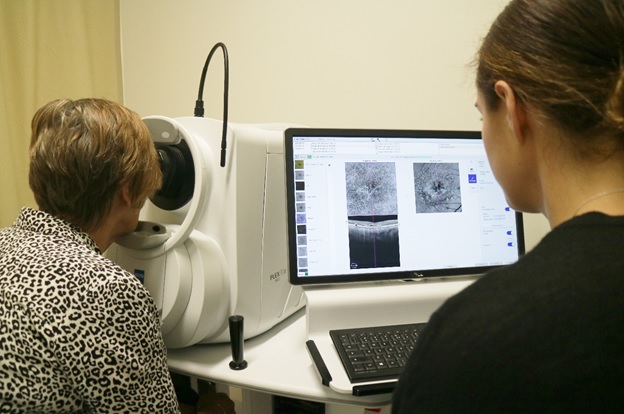Improve your eyecare clinical skills through new education course from world leaders
Age-related macular degeneration (AMD) is a retinal condition where central vision is threatened, with devastating consequences for people who lose vision as a result of the late stages of this common disease.

It is the leading cause of severe irreversible vison loss in adults over the age of 50 years in Australia. 1 in 7 people in this age bracket will develop signs of AMD and 1 in 7 of these people will go on to develop vision-threatening complications.
Luckily, there are people who are working to eradicate this disease completely, such as Prof Robyn Guymer and Dr. Lauren Ayton. Together, they are developing a new course with the University of Melbourne – Mobile Learning Unit. The aim of this clinically-focused course is to ensure that primary eye practitioners have direct access to the latest research findings about age-related macular degeneration and can use this new knowledge in their management of patients with AMD.
“We are excited to develop this interactive communication channel, from the researchers directly to the practitioners,” said Dr. Ayton. “Researchers represent at conferences and write scientific papers, but that’s a slow process to disseminate our learnings. The idea with this online course is that we can provide new information in a timely manner to primary eyecare practitioners so that they, and their patients, can gain the benefit as soon as possible.”
One of the highlights of the course is detailed education on how to interpret ocular imaging. Traditionally, when patients went to see an eyecare practitioner, clinical observation of the back of the eye would have been the main way to monitor disease. With the developments of modern technology, there are now plenty more ways to observe and document these changes. The course discusses new imaging biomarkers from optical coherence tomography, near-infrared imaging and autofluorescence. Professor Guymer says the key feature of the course is its truly translational relevance. It will bring a new understanding of the disease, gained through interpreting multimodal ocular images, to the day-to-day practise of clinicians.
“We want practitioners completing the course to take away a new understanding of the disease that will impact on their everyday interactions with patients with AMD”, said Professor Guymer.
The course also covers information on risk factors for AMD, that inform eyecare practitioners on patient prognosis. New information on potential interventions for intermediate AMD, and pharmaceutical and cell therapies for late disease, are detailed.
Prof Guymer and Dr Ayton hope that this online course will help eyecare practitioners to upskill and keep them up to date with the latest research results that can be translated directly into the clinic. The course will be an excellent way to share new information about experimental and approved therapies that emerge in the future, such as gene therapy, stem cells and the developments of new drugs.
This course is not only designed for optometrists, but also for general practitioners who have a particular interest in eye care, orthoptists, ophthalmic nurses and ophthalmology trainees.
Prof Guymer is the Deputy Director of the Centre for Eye Research Australia and the Head of its Macular Research Unit. She is also a Senior Retinal Specialist at the Royal Victorian Eye and Ear Hospital and in private ophthalmology practice. Prof Guymer was recently recognised as Australia’s leading researcher in ophthalmology, and #3 expert in AMD globally.
Dr Ayton is a NHMRC Clinical Research Fellow within the Departments of Optometry and Vision Sciences, and Surgery (Ophthalmology) at the University of Melbourne. She heads the Vision Optimisation Unit and has worked on projects in AMD with Prof Guymer for over 10 years.
They have assembled a world leading team of experts to write content for this course, including Prof Erica Fletcher, Dr Zhichao Wu, A/Prof Laura Downie and Dr Carla Abbott, all clinically trained and active researchers in AMD.
The Age-Related Macular Degeneration for Primary Eyecare Practitioners online course will be available through The Mobile Learning Unit at the end of April 2020. It contains 10 hours of eLearning, with 10 case studies and 8 units of self-assessments. Due to its online learning form, this course can be completed anytime, anywhere at the learner’s own pace.
To learn more about this course, please visit